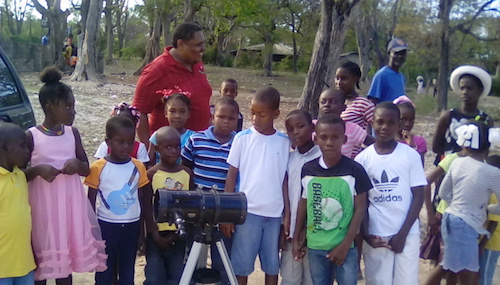by Roberto Molar Candanosa

The Haitian Astronomical Society (HAS) will soon be hosting live radio programs to teach Haitians about astronomy and update them on recent discoveries. The show will also reach Haitians—and anyone else around the world who wants to listen — through live internet broadcasts. And the new broadcasts will be possible thanks in part to the Big Impact Giving (BIG) project run by Astronomers Without Borders.
Rulx Narcisse, founder of HAS, plans to start the radio show as soon as HAS can raise funds to cover radio station, Internet, and other fees, and it will be recorded live, with the episodes being available in an archive on the society’s website.
The show will focus on the latest news in astronomy but also include discussions on central topics like our universe, the solar system, and constellations. It’s also structured to allow listeners to participate and ask questions via social media or text messages.
Astronomers Without Borders is working with HAS to fund the radio program through their BIG (Big Impact Giving) Project, a micro-crowdfunding initiative that helps groups with their outreach and education programs. For many organizations, small donations can make a big difference.
Narcisse said the show will help Haitians understand the world and the universe around us. He said some Haitians confuse astronomy with astrology, a mystical pseudoscience. “Our society is full with misunderstandings of natural phenomena, and mysticism is very accepted by many of us,” Narcisse said. “Learning about science is a way to help Haitians have a better understanding of reality.”
Narcisse hopes to work with other amateur astronomy clubs worldwide. He wants stargazers around the world to think of Haitians as people who know and love astronomy. “Around the world, they may know that there is a little group thinking too about science, about astronomy,” he said. “We want to be part of this human adventure—we have people interested.”
The society hopes to inspire future generations of Haitians to think about astronomy as an important science, despite the view of some that there are higher priorities for their country. Narcisse wants to get more people interested in learning about the stars and universe. “Astronomy is surely done by some isolated persons in the country, but there is not structured association or organization to orientate them,” he said.
For Narcisse, astronomy education is a way to empower young Haitians. “The Haitian Astronomical Society has its part to play in the development of the country, particularly in the education of the public,” he said. He envisions an HAS that will influence Haitians to engage in science discussions. “We need a new image of the country, and doing science is one way of doing so.” A science-driven society, he said, means they will be able to proudly represent Haiti in the global scientific community.
A physician by training, Narcisse grew up watching the stars with his father and learning about celestial bodies like the Halley’s Comet. He also grew up reading inspiring science and fiction authors like Isaac Asimov. This early exposure to astronomy motivated Narcisse to teach himself about astronomy using textbooks and online courses.
Narcisse knows that not all Haitians have the resources or exposure he had to learn about astronomy, so he often shares what he has learned with others. He hopes that young Haitians follow his steps with HAS. “Young Haitians may be able to continue with our mission and even have higher goals for the Haitians in astronomy,” he said.
Founded in October 2013, HAS has two functional clubs in Haiti. Their main educational activities include hosting public stargazing events and astronomy classes.
To learn more about how you can help fund the HAS radio program visit: https://www.fiatphysica.com/campaigns/astronomy-radio-show-in-haiti.
To learn more about The Haitian Astronomical Society and Dr. Rulx Narcisse, visit: https://www.facebook.com/SocieteHaitienneDAstronomie.







